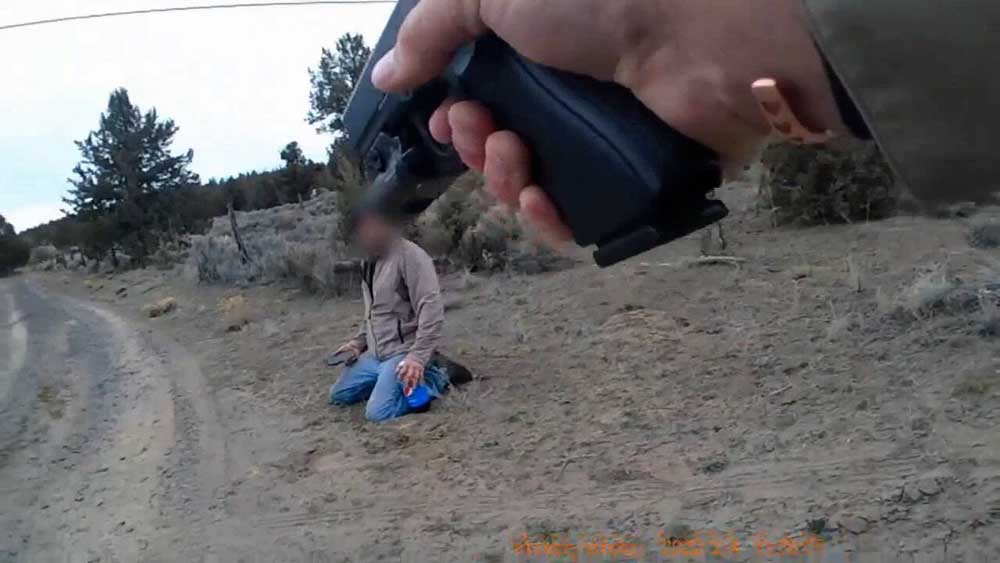Crook County police shooting lawsuit can move forward, judge rules
Published 11:00 am Tuesday, June 11, 2024

- A screen capture from the bodycam footage of the Feb. 4, 2022, encounter between Crook County Sheriff’s Deputy Steven Hatcher and Nick Rodin, whom Hatcher shot and killed.
PRINEVILLE — A wrongful death lawsuit against Crook County and Crook County Sheriff’s Deputy Steven Hatcher can move forward, a federal judge ruled last week.
Hatcher fatally shot Nicholas Rodin while taking him into custody in 2022. The Crook County district attorney had previously determined the shooting to be justified.
The case will determine if Hatcher adequately explored non-lethal alternatives before firing his weapon and killing Rodin, and could hinge on whether or not Hatcher’s demeanor during the encounter unnecessarily escalated the situation, said Michael Fuller, who represents Rodin’s family in the civil case.
No trial date has been set and the case is waiting for a judge to be assigned, but Fuller told The Bulletin that U.S. District Judge Marco Hernandez’s decision to reject summary judgment was a major win for Rodin’s family.
“They were given hope. The judge essentially determined that there was sufficient evidence in the record of a wrongful death to proceed to trial,” Fuller said.
“That affirmed what the family’s belief has been all along, that this was an avoidable death and it didn’t need to happen this way,” he said.
Events leading up to Rodin’s death
Hatcher first encountered Rodin along a rural road in Crook County on Feb 4, 2022. Earlier that day, Hatcher had been informed by the night officer that a man matching Rodin’s description had called 911 asking for a police pick-up. On the call, the man — Rodin — told the dispatcher he was armed with a .22 caliber handgun and a knife.
The pair agreed that the call was a possible suicide-by-cop situation.When he spotted Rodin, Hatcher called for back-up and stated his intention to play the encounter slowly while he waited for another officer to arrive.
However, Hatcher did not wait before he drew his weapon on Rodin, demanded he get on the ground and yelled “you’re goddamn right I’ll kill you!,” according to police body camera footage of the incident.
Rodin had reached for a ringing cell phone in his back pocket.
From there, both parties escalated their language. Rodin requested to call his pregnant girlfriend and Hatcher threatened to shoot Rodin if he did. Rodin continued to argue that he did nothing wrong while Hatcher made repeated demands for Rodin to get on the ground despite the fact video footage showed Rodin had already complied.
“Shoot me! Do it! I ain’t scared, I ain’t scared of you dude, what’s up?” Rodin responded, standing up from the ground where he was. “I want to die.”
The pair exchanged more words before Rodin reached again for his back pocket and Hatcher shot him twice in the chest, the video shows. An investigation showed Rodin had not possessed any weapons.
Wrongful death allegations
While Crook County District Attorney Kari Hathorn found the shooting justified, Fuller intends to argue in the civil suit that Hatcher wrongfully caused Rodin’s death on several levels.
The simplest is that Hatcher and the Crook County Sheriff’s Office were negligent in failing to pursue non-lethal means of subduing Rodin.
“One of the alternatives that officers must consider under Oregon law is verbal de-escalation. And so doing the opposite — verbally escalating — wouldn’t comply with that law,” Fuller said.
Verbal de-escalation, Fuller said, should have doubly been explored because of Hatcher’s ongoing mental health crisis and Hatcher’s suspicion that Rodin might try to engage in suicide-by-cop.
“We know that officers are trained, or should be trained, to avoid suicide by cop scenarios … so that would have been even more reason to engage in verbal de-escalation instead of screaming profanities and death threats,” Fuller said.
Another argument against Hatcher is that he did not possess any non-lethal weapons at the time he engaged Rodin. Court documents say the only weapons Hatcher had on him were his police-issued Glock 9 millimeter gun and a short-barreled rifle. He did not have pepper spray, nor was he carrying his police-issued taser because it was out of service.
Question of excessive force
While Hernandez’s decision allows the wrongful death claim to proceed, it did reject the family’s claim that Hatcher used excessive force on the grounds that Hatcher acted under qualified immunity, which protects officers from liability unless they violated a constitutional right.
While the plaintiff argued Hatcher was in no genuine danger because Rodin never possessed a weapon, the judge determined Rodin’s earlier statement to 911 that he was armed justified Hatcher’s use of force. Rodin also had an active warrant out for his arrest.
While Fuller and his clients do not plan to appeal that summary judgment on excessive force yet, they plan to if it becomes apparent a jury cannot wholly understand the case without the added context.
“Judges in the appellate courts have made it very difficult to bring constitutional excessive force claims. We understood that it would be a difficult claim … We’ll wait and see. If we think that the jury’s verdict would have been better for the family if that claim was included at trial, then we would appeal that dismissal.”





